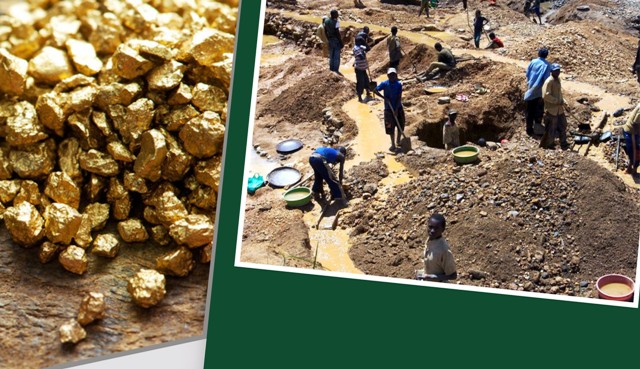Editorial
Still On Illegal Mining In North

Following the sustained illegal mining activities by individuals in the Northern part of Nigeria, the Ijaw Youth Congress (IYC) Worldwide recently called for an amendment of the country’s Constitution to allow states harness and control the resources in their areas.
According to the President of the body, Barrister Roland Oweilaemi, “With the rather surprising news of illegal mining activities in the Northern part of the country where powerful individuals are allowed to tap the natural resources in their domains, IYC is calling on the Federal Government to commence the amendment of the Constitution by allowing states to harness and control the resources in their domains…”
The IYC accused the Federal Government of being unfair by choosing to protect oil and gas facilities at the expense of the crude oil-bearing communities of the Niger Delta because oil is seen as a national property while solid minerals in the North belong to powerful feudal lords.
Even though illegal mining activities have endured in the North without any official hindrance, it is the resultant widespread banditry that ostensibly propelled the government to recently pronounce a ban on all solid mineral exploitations in the region.
This is not the first time the umbrella body of Ijaw youth organisations has spoken on illegal mining in the North. Earlier in the year, when the Minister of Solid Minerals and Steel Development, Alhaji Bawa Bwari, confirmed to the world that Nigeria lost over N350 billion to illegal gold mining within the three years between 2016 and 2018, the IYC was among the first groups to flay the Federal Government over the issue.
The IYC was also obviously unimpressed by the minister’s quick reassurance that the government planned to reverse the trend as it had since evolved a new draft policy intended to reorganise the gold value chain and generate revenue for the nation.
Speaking through one of its leaders, Eric Omare, the youth group accused the Federal Government of lacking the political will to implement the country’s mining laws because of vested interests.
“Firstly, there is a law which generally regulates mining in Nigeria, including gold, which is the Minerals and Mining Law of Nigeria Cap M12 Laws of the Federation of Nigeria…
“I think that the reason the Federal Government is unable to implement the law on mining may be because the individuals involved are politically and economically connected people,” Omare said.
The Tide shares the concern of the IYC on this issue. Not only has the nation’s Gross Domestic Product (GDP) been devoid of any contributions from unlicensed mining activities in the North, the states from which these precious metals are brazenly exploited, with so much environmental despoliation, belong among the poorest in Nigeria. Yet, they would rather congregate in Abuja every month to share from the revenue that derives almost entirely from the nation’s crude oil and gas exports.
While the Nigerian military combed the creeks of the oil-rich Niger Delta region under “Operation Crocodile Smile” and other bizarre code names to protect oil facilities and also ensure that the nation lost no revenue to oil thieves, the North remains a free-for-all solid minerals mining haven for indigenous and foreign plunderers.
We recall that agitations for restructuring of the country so as to ensure fiscal federalism have been ignored by successive military and civilian administrations.
At the inception of the present administration, Nigerians were told that states would be encouraged to partner the Federal Government in harnessing solid mineral resources for the benefit of the country. It is, therefore, disappointing to note that, four years down the line, efforts are still stagnated at the planning stage.
To think that Nigeria could afford to lose over N350 billion to illegal gold miners within the very period she suffered her swiftest and most excruciating recession ever, is rather disturbing.
Equally stunning is the fact that the nation was, at that point, in dire need of revenue from diverse resources to shore up its dwindling inflow from petroleum whose international price had gravely plummeted and output quota cut low.
If this figure is for gold alone, we then wonder what the nation’s loss would have amounted to if the sums for the other rare gems found in the country had been included in the ministerial arithmetic.
The Federal Government should endeavour to hasten the process of ensuring that the solid minerals sector is well regulated across the country and that all the revenue accruing therefrom is received and fully accounted for. This will, hopefully, serve to calm frayed nerves.
Editorial
Beyond Accessing Bonny By Road

Editorial
Time For GL 17 In Rivers

Editorial
For A Prosperous 2026

-

 Sports3 days ago
Sports3 days agoTinubu Lauds Super Eagles’ after AFCON bronze triumph
-

 Sports3 days ago
Sports3 days agoFulham Manager Eager To Receive Iwobi, Others
-

 Sports3 days ago
Sports3 days agoAFCON: Lookman gives Nigeria third place
-

 Sports3 days ago
Sports3 days ago“Mikel’s Influence Prevent Some Players Invitation To S’Eagles Camp”
-

 Sports3 days ago
Sports3 days agoMan of The Match award Excites Nwabali
-

 Niger Delta3 days ago
Niger Delta3 days agoINC Polls: Ogoriba Pledges To Continuously Stand For N’Delta Rights … Picks Presidential Form
-

 Editorial3 days ago
Editorial3 days agoBeyond Accessing Bonny By Road
-

 News3 days ago
News3 days agoSERAP Sues Govs, FCT Minister Over Security Vote Spending

